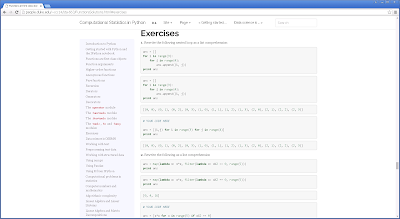Computational Statistics in Python: Exercises
I worked through Exercises section of the Computational Statistics in Python tutorial.
Below are the results, with some variations i generated to get a better understanding of the solutions:
Below are the results, with some variations i generated to get a better understanding of the solutions:
# Exercises
"""http://people.duke.edu/~ccc14/sta-663/FunctionsSolutions.html#exercises"""
"""1. Rewrite the following nested loop as a list comprehension
ans = []
for i in range(3):
for j in range(4):
ans.append((i, j))
print ans"""
arr = [(i,j) for i in range(3) for j in range(4)]
arr
"""2. Rewrite the following as a list comprehension
ans = map(lambda x: x*x, filter(lambda x: x%2 == 0, range(5)))
print ans"""
arr = [x**2 for x in range(5) if x%2 == 0]
"""3. Convert the function below into a pure function with no global variables or side effects
x = 5
def f(alist):
for i in range(x):
alist.append(i)
return alist
alist = [1,2,3]
ans = f(alist)
print ans
print alist # alist has been changed!"""
def f(alist, x):
newList = alist.copy()
for i in range(x):
newList.append(i)
return newList
alist = [1,2,3]
ans = f(alist, 5)
print(ans)
print(alist) # alist has been changed!"""
# better example
def f2(alist, x):
return alist + [n for n in range(x)]
alist2 = [1,2,3]
ans2 = f2(alist2, 5)
print(ans2)
print(alist2) # alist has been changed!"""
# even better example
def f3(alist, x):
return alist + range(x)
"""4. Write a decorator hello that makes every wrapped function print “Hello!”
For example:
@hello
def square(x):
return x*x"""
#import datetime
def TimeThis(func):
def timer(*arg1, **arg2):
start = datetime.datetime.now()
func(*arg1, **arg2)
end = datetime.datetime.now()
return print(end - start)
return timer
@TimeThis
def readfile(str):
return [line for line in open(str)]
readfile("requirements.txt")
"""5. Rewrite the factorial function so that it does not use recursion.
def fact(n):
# base case
if n==0:
return 1
# recursive case
else:
return n * fact(n-1)"""
# still uses recursion
def factCached(n, cache={0:1, 1:1}):
try:
return cache[n]
except:
cache[n] = n * factCached(n-1)
return cache[n]
# assignment
def factAssignment(n):
x = 1
if n == 0 or n == 1:
return x
else:
for i in range(1, n+1):
x *= i
return x
arr1 = [factCached(x) for x in range(10)]
arr2 = [factAssignment(x) for x in range(10)]
"""Exercise 6. Rewrite the same factorail funciotn so that it uses a cache to speed up calculations"""
# still uses recursion
def factCached(n, cache={0:1, 1:1}):
try:
return cache[n]
except:
cache[n] = n * factCached(n-1)
return cache[n]
arrEx6 = [factCached(x) for x in range(10)]
"""7. Rewrite the following anonymous functiona as a regular named fucntion: lambda x, y: x**2 + y**2"""
@TimeThis
def hypotSquared(x, y):
return x**2 + y**2
import math
@TimeThis
def hypotSquaredAlt(x, y):
return math.hypot(x, y)**2
hypotSquared(3,6)
hypotSquaredAlt(3,6)
"""8. Find an efficient way to extrac a subset of dict1 into a a new dictionary dict2
that only contains entrires with the keys given in the set good_keys. Note that good_keys
may include keys not found in dict1 - these must be excluded when building dict2.
import numpy as np
import cPickle
try:
dict1 = cPickle.load(open('dict1.pic'))
except:
numbers = np.arange(1e6).astype('int') # 1 million entries
dict1 = dict(zip(numbers, numbers))
cPickle.dump(dict1, open('dict1.pic', 'w'), protocol=2)
good_keys = set(np.random.randint(1, 1e7, 1000)"""
dict1 = {str(x): x**2 for x in range(1, 100)}
good_keys = set(str(x) for x in range(30, 70))
dict2 = {x: dict1[x] for x in dict1.keys() if x in good_keys}



Comments
Post a Comment